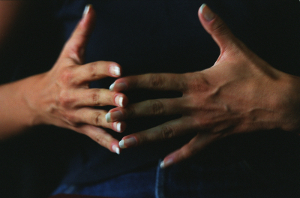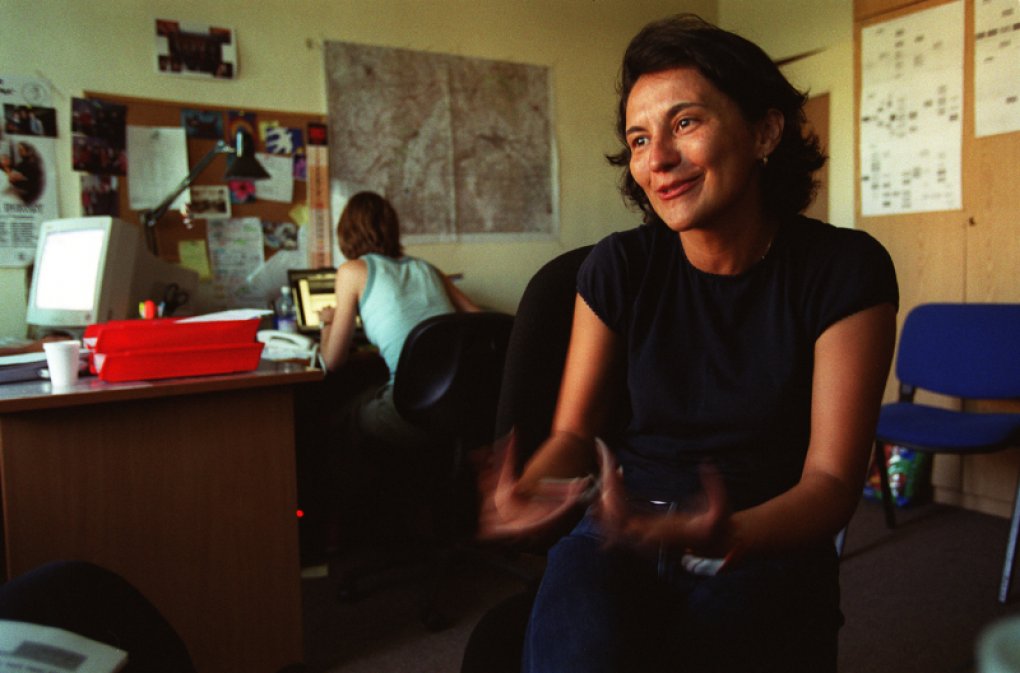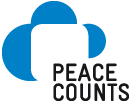Macedonia: Elena mediates
 by Michael Gleich
by Michael Gleich
Photos: Uli Reinhardt
Intercultural dialogue requires translators – people at home in more than one world. Elena Gulmadova is from the central Asian republic of Tajikistan. She is a diplomat and a gynecologist. Her father worships Allah, her mother Jesus. She mediates in Macedonia between warring Muslims and Christians.
In the ruined mosque, a woman is talking. She wanders back and forth under the mangled dome with a vacant look and a cell phone pressed to her ear. The rich calligraphy of “God is great” on the wall has been relieved of the word “great” by a grenade. Probably a coincidence – unlike the deliberate toppling of the minaret by Christian soldiers. That took half an hour one sunny day in May. The white tower fell on the dome, crushing its metal framework. The dome now hangs in jagged shreds from a height of 40 feet. The landing of a rock dove easily starts it swaying. The birds see the former house of worship as a new kind of cliff, with easy access to safe nesting places. Wild animals take things as they come. For humans, overcoming loss can take generations.
The woman continues to talk on the phone, ignoring the pigeons and debris. She is arranging meetings – with the school principal, the chief of police, representatives of the Macedonian minority in the Muslim village of Matejce. Her topic is reconstruction, not only of the mosque. Financed by the villagers themselves, it was only three years old on the day of its destruction. The school, too, was destroyed in the 2001 summer war. Half the houses are uninhabitable. Matejce is not an inviting place.
And the woman stands among the ruins and makes dates. Elena Gulmadova works for the Organization for Security and Cooperation in Europe (OSZE). She is 30, attractive and shy. Her title is “Confidence Building Officer.” She should foster and instill trust. Is that possible – can reconciliation be organized? Can trust be made to order, peace delivered as a service by a perfectly normal woman who is neither Mother Theresa nor Lady Di?
In Macedonia, the OSZE is at least trying. It mediates between the Muslim Albanians and the Christian Macedonians. The woman and men in the white cars are the eyes and ears of the international community. Around 150 imported experts are training police, observing trials to ensure human rights are respected, returning refugees safely to their home villages, and directing the distribution of financial aid.
Elena drives the white SUV decorated in huge letters with “OSZE” into the courtyard of Matejce’s school. The principal greets her with kisses on both cheeks. Elena has been here often. Xhevdet Pramani leads her through the long, bare hallways. Masons are at work, fixing the wounds ripped by mortar fire. Many windows are shattered, and for two years there has been no money to replace them. Children’s drawings hang next to shrapnel holes. An anatomical model lies on the hallway floor like a corpse.
“They shot out the toilets, there’s no water, and we don’t have a single computer,” Xhevdet complains.
“But you’re rebuilding,” says Elena. “It looks terrific.”
“But there are 45 kids in each class!”
“Come on, let’s take a look and see what we can do.”
Documents are spread across a plastic table. Elena has brought application forms for EU reconstruction funds. She helps him fill them out. But she can’t entirely silence the principal’s laments. Matejce will never be the same. An Albanian, he doesn’t believe the Macedonians will ever come back. “Even though we did nothing to them.” The poison of hatred has a long half-life. The army began the conflict by shelling Albanian houses. When the army retreated, the Albanians looted and burned the houses of their Macedonian neighbors. Hundreds of years of peaceful coexistence weren’t enough.
“It’ll be all right, Xhevdet,” Elena says. “As soon as their houses are rebuilt, they’ll come back.” She is intent on maintaining her optimism.
With a combination of practical advice and psychological counseling, Elena has won the trust of the people of Matejce. She exploits it to persuade each group to understand the position of the other. It sounds as if rational argumentation might be her most important skill, but sometimes feelings get the upper hand. “When I meet a refugee family that has nearly nothing to eat, whose children are freezing, whose home is dust and ashes,” she says on the way back to her headquarters, “I have to fight not to cry. But pity doesn’t help anybody. I feel better as soon as I find a way to give them practical help. Looking to the future protects you from despair.” She means the victims, but the sentence is valid for her as well. Torn between inevitable sympathy and clinical neutrality, she supports the traumatized villagers as best she can.
She dismisses compliments with “Nothing spectacular.” The OSZE has no budget of its own. But it can intercede with international donors, piece by piece – a repaired street, a field cleared of mines, money for a community center. Elena and her team handle the red tape. They encourage, explain, mediate, persuade, facilitate. Discussions between the parties are repeated again and again. The conversations often go in circles. The tiny, painful steps towards peace are like a children’s tower of wooden blocks. Block after block goes up, but the higher the tower, the more unstable. We begin to understand that the mountains of Macedonia have no use for diplomats in tuxedos, or even for charismatic personalities. Patient laborers are needed to pile up the same blocks year after year. They can never give up, even when everything they have built collapses, as it so often does in the Balkans.
Macedonia was seen for decades as a model of a successful multicultural society. Albanians, Turks, Roma, Serbs, and the Macedonian majority lived together in relative harmony. The OSZE “Spillover Mission” that began 12 years ago was intended only to keep the bloody Balkan wars from spreading to Macedonia. Until February 2001, it worked. But then Albanian nationalists took policemen hostage. The army occupied mountain villages, and the shooting and burning began. The police and the army are largely Macedonian, the mountains north of the capital Skopje mostly Albanian – a highly explosive combination. Politicians and media beholden to them fed the hatred between the two groups. The civil war lasted six months. That was long enough to kill hundreds of people and drive 170,000 from their homes. Farms and pastures became minefields. The country was deeply divided. In August 2001, the Albanian nationalists and the government negotiated a ceasefire, the Ohrid framework agreement.
Signatures on paper are not enough to bring peace. Peace is a process, that must turn agreements into forgiveness. Elena patrols a wooded area north of Matejce. The delicate woman’s arm muscles flex as she steers the heavy vehicle through ruts and potholes. “It’s hard-to-get-to areas like this where we’re most needed, to make sure things are working as they should.” These are the haunts of criminal gangs, illicit loggers, and traffickers in human flesh moving their wares from east to west. Is she afraid? “There’s no reason for the gangsters to attack us. They know we can’t arrest them. We can only observe.” Sometimes she feels uneasy, especially since two Norwegian U.N. soldiers were killed by a mine not far from here. But she doesn’t let the fear take over.
On a mountain peak stands a 600-year-old monastery. In peacetime it is picturesque, in wartime strategic. Rebels of the Albanian UCK treasured its commanding view of the surroundings and its clear lines of fire. Their graffiti adorn their medieval frescos in the basilica. Now the army watches over the monument, hoping to prevent further vandalism. Under a spreading beech tree, the soldiers have cobbled together a dinette from rough boards. One of them dozes on a cot. He rises slowly to greet us.
“Everything quiet?” Elena asks.
“Worse,” the young lieutenant says. “Boring. But that’s better than too much happening, right?” Elena points at the Kalashnikovs lying on a bench. The soldiers murmur in assent. Their bilingual murmuring is one of the small signs of progress that keep Elena going. The OSZE put pressure on the army to recruit Albanians. Now that the squads are mixed, their is less tension with the villagers. Do they get along? The lieutenant nods toward the field kitchen. An Albanian washes vegetables while a Macedonian cooks. Peace is at hand, at least in the kitchen.
The Tajik Elena needs a translator for both languages. To understand human nature, she is on her own. She negotiates with notorious liars, with corrupt judges, with teachers and farmers, priests and imams. She must find the right tone every time. Often enough, the right thing to say is nothing at all. She listens attentively. Her unassuming presence signals: I am here for you. Anyone disappointed by her lack of charisma quickly sees what an advantage her reserved but stubborn character gives her in the midst of conflict.
Her origins also help. Whenever she enters a village for the first time, the cat-and-mouse questions begin. The villagers want to know if she has secret sympathies for one side or the other. “Are you Christian or Muslim?”
“Half-and-half.”
“How’s that supposed to work?”
“My father is Muslim, my mother is Christian.”
“And which of them do you love more?”
“I love them both equally, believe me.”
She tells them of Tajikistan, of the capital Dushanbe where she was born, of how she misses her family. She smiles, and their doubts melt. She is neutrality incarnate. She could tell them a lot more. Her student years overlapped with five years of war and instability in Tajikistan. The army raided her family’s house after a neighbor shot at a pro-government rally from the roof. When the electricity failed, nights were spent in cold and darkness. The family fled briefly to the Ukraine, where they lost contact to her father. The telephones lines to Dushanbe went dead.
But she prefers to keep those stories for herself. Elena likes neither to let people too close, nor to take center stage. She avoids using her biography to gain entrance to the small, hermetic world of the mountain villagers. Yet it is her experiences in Tajikistan that make her more sensitive than some of her western OSZE colleagues. They have no firsthand experience with war and displacement. Elena knows what people are talking about when they speak of the horror of summer 2001. It strikes a nerve, making indifference impossible. A talent for empathy need not be inborn – it can be learned. Elena has forgotten how to shrug her shoulders and say, “Who cares?” Her hands say it all: Her thin fingers fan out over the tabletop, her fingertips touch. Sometimes she stretches out her arms in a way that seems to embrace the entire world. But those hands aren’t afraid to get dirty when the situation requires.
On a November night in 2001, Elena’s cell phone rang. It was a time of maximum tension, just after the end of open warfare. Rexhep Shaqiri, the mayor of Opae, was screaming in panic. “We’re under attack! You have to help us! Right now!” Opae has only 200 inhabitants, most of them Albanian. Masked Macedonian police had surrounded the village. Hearing shots, they fired blindly into the center of town with machine guns and grenade launchers. Luckily, Elena had saved the telephone number of the police chief from a previous meeting. In a few minutes she had him on the phone. She told him what the mayor had told her: The shots he had heard were fired into the air from a wedding celebration.
“How are we supposed to know that?” the police chief demanded. But the shooting stopped.
Miraculously, no one in Opae was injured. One phone call, and the war was over. “If only it were always that simple,” Elena sighs. Her coolness in difficult situations, vital for survival in a crisis zone, was learned in a surprising place: the delivery room. She studied medicine, specializing in gynecology. “During the war, there were often blackouts in Dushanbe. We delivered babies by candlelight. If the women’s water had already broken, it was sometimes a matter of seconds, of life and death. Our professor drilled us to stay calm even in the most chaotic situations, to keep our hands steady.” The “Don’t panic!” training proved highly relevant to her assignment in the Balkans.
Elena became a doctor because she likes people, and a gynecologist “because every new baby is a nice success experience.” But after only a few years, the maternity ward seemed too small. She wanted to see the world. Lucky for her, the newly independent republic was looking for diplomats. In a crash course lasting only four months, she was trained for tasks on foreign soil. Sarajevo was her first stop, but the job was administrative, “too far from human beings.” Since she switched to the OSZE office in Kumanovo, she is again something like a doctor, one with a very difficult patient. An entire nation is hurting, body and soul. Bandages here and there – can they bring peace? “Albanians, Macedonians, Roma, they all agree on one thing. If the foreigners left, the war would break out again. So we stay.”
How necessary their presence is, how deceptive and superficial the peace is, becomes apparent in our last days in Skopje. Midsummer lures the population into sidewalk cafés. In the evenings, hip young people stroll the banks of the Vardar. The smell of grilling meat wafts through the squares. Mediterranean flair, the Balkans at their best, and you start to think: what a great place to go on vacation!
Then three bombs explode, one after another, in the middle of the city. Suddenly everything is different. The bombs are presumed to have some connection with a hostage-taking in the areas where Elena works. An Albanian nationalist, a wanted organized crime figure with the nom de guerre Shakala, was stopped in his car by police. Instead of showing them his ID, he pulled a gun and took two policemen hostage. As word of the attack spreads, it triggers the collective memory of the Macedonians. Isn’t this how the war started the last time? The OSZE puts its employees on red alert.
We meet with Elena one last time. As in the time just after the ceasefire, she is permitted to patrol only in an armored car. She gets out wearing a white helmet and a bulletproof vest made of lead. Once again she is driving from place to place, calming mayors and farmers, Albanian extremists and Macedonian soldiers. No, the army won’t occupy the villages. No, the rebels aren’t planning an offensive. Yes, call us if anything happens, and on to the next conversation. Elena knows that in a tense situation, maintaining contact becomes more important than ever. She is on the road 12 hours a day. She steers with one hand and works the cell phone with the other. She reduces peace, actually a complex matter, to a simple formula. “As long as people are talking to each other,” she says, “they hold their fire.”


